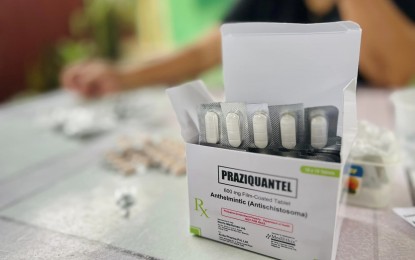
FIGHTING SCHISTO. Some of the praziquantel tablets from the Department of Health. Residents in areas endemic to schistosomiasis are assured of sufficient stocks of praziquantel tablets to combat schistosomiasis in four provinces of the Eastern Visayas region. (Photo courtesy of Burauen, Leyte rural health unit)
TACLOBAN CITY – Residents in areas endemic to schistosomiasis are assured of sufficient stocks of praziquantel tablets to combat schistosomiasis in four provinces of the Eastern Visayas region, the Department of Health (DOH) regional office here said on Tuesday.
There are still over 116,000 tablets stored at the DOH regional office in Palo, Leyte, while thousands of tablets are ready for administration in provinces, cities, and towns, said Flor Jimenez, DOH regional schistosomiasis program manager, in a phone interview.
“These inventories are the medicines not used last year with an expiration date of 2025. We encourage everyone living in endemic areas to take this medicine. This life-saving and effective treatment is free,” Jimenez told the Philippine News Agency.
“If we need more, we can request more medicines from our central office to support our mass drug administration activities,” she added.
The official made the assurance after the reported non-availability of praziquantel tablets in rural health units in 2022 and some parts of 2023.
The official admitted that fighting the disease was not prioritized during the pandemic since government resources were focused on battling the Covid-19 pandemic.
The target is to cover at least 85 percent of the exposed population every year in mass drug treatment.
In the region, nearly one million people remained exposed to chronic parasitic disease.
The disease, also known as snail fever, is endemic in 897 villages in 63 towns and cities in Leyte, Samar, Eastern Samar, and Northern Samar provinces.
The DOH emphasizes the importance of treatment as the country celebrates schistosomiasis awareness and mass drug administration month this January.
The health department defines schistosomiasis as an acute and chronic disease caused by parasitic worms called trematodes or blood flukes.
The most common symptoms of the disease are abdominal pain, diarrhea, bloody stool, and liver enlargement.
Transmission occurs when people suffering from schistosomiasis contaminate freshwater sources with their feces containing parasite eggs, which hatch in the water.
The first epidemic of schistosomiasis in the region occurred among Americans and Allied forces after landing in Leyte during World War II in 1944. (PNA)
